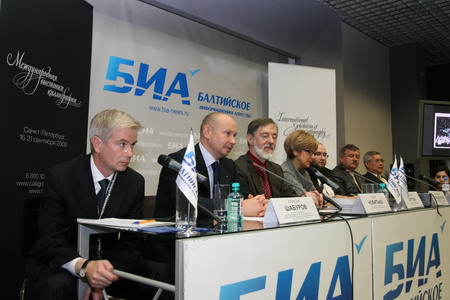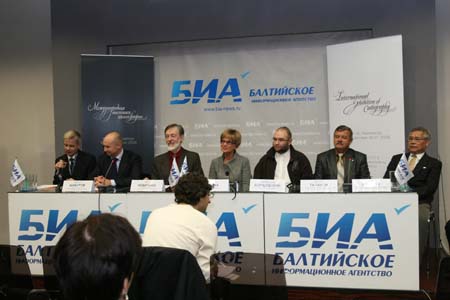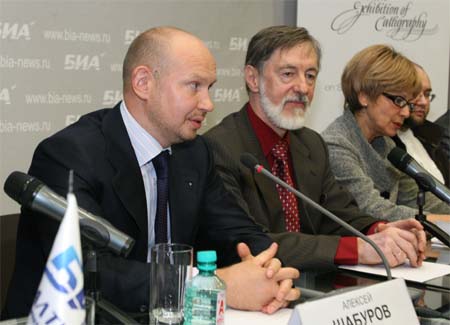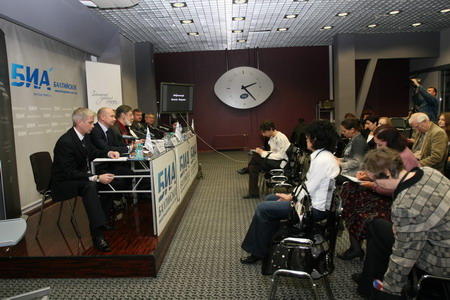Press Conference on the Grand Opening of the International Exhibition of Calligraphy
Today, at 02.00 pm, Saint Petersburg hosted a press conference on the Grand Opening of the International Exhibition of Calligraphy. The conference was organized by the Baltic Information Agency, the forum’s media partner.
 The press-conference
The press-conferenceThe press-conference was attended by:
- Alexey Shaburov, General Manager of the International Exhibition of Calligraphy;
- Pyotr Chobitko, Chairman of the Presidium of the National Union of Calligraphers;;
- Valentina Orlova, Chairman of the Board of Directors of the World Club of Petersburgers;
- Nikolai TaranovCalligrapher, Doctor of Pedagogic Sciences, Candidate of Art History, Professor, member of the Union of Artists of Russia;
- Chen Wen-Fu, Calligrapher — continuator of a great dynasty of Chinese calligraphers, member of the Chinese Scientific Union of Antithetical Couplets;
- Avraham Borshevsky, Hebrew scribe and illuminator living and working in Jerusalem, Israel.
The authors and participants of the International Exhibition of Calligraphy consider this event to be a real milestone in the world of art – the “renaissance of the Russian calligraphic school”, offering calligraphy gurus and masters coming from twenty-five countries to get acquainted with a diversity of schools and trends.
 The press-conference at the BIA
The press-conference at the BIAIn her greeting speech, Valentina Orlova admitted that she had had a soft spot for calligraphy from her childhood. She also noted that she, being President of the World Club of Petersburgers, is immensely pleased with the fact that the show is taking place in her home city.
The Organizers’ Committee states that the core mission of the International Exhibition of Calligraphy is to turn the attention of the general public to the art of calligraphy. Pyotr Chobitko, Chairman of the Presidium of the National Union of Calligraphers, remarked, “there are many languages in the world, but there is only one language of calligraphy, which is clear and easy to understand. We do understand – even perceive - what an individual feels through each and every dot, line or spot.”
Professor Nikolai Taranov, one of the authors displaying their works at the International Exhibition of Calligraphy, said, “People who come here are quite amazed at the delicate and quaint ways we can all write”.
During the first half of the first working day, this magnificent event attracted more than 500 people.
 The press-conference at the BIA
The press-conference at the BIAIt took the project long nine months to see the light. Within this time span, a special committee had selected seven hundred most interesting works. However, only four hundred eighty were exhibited at the Repin State Academic Institute of Painting, Sculpture, and Architecture of St. Petersburg. Alexey Shaburov, Director of the Contemporary Museum of Calligraphy and President of Sokolniki Museum-Educational Complex, specified, “We did not want to make a clutter of the superb and elegant 18th-19th-century interiors. We were afraid to encumber them with excessive items and stuff.”
He also noted that apart from works and presentations of modern authors, the exposition could not accommodate fifty museum pieces kindly offered by the State Historical Museum and the Russian State Archive of Ancient Manuscripts as well as by a bundle of private collectors. Nevertheless, the exhibition turned out to be a majestic and hot event.
Our visitors were offered ample opportunities to learn more about the art of calligraphy. They were welcomed to master-classes, which were first and foremost targeted at professional artists and calligraphy writers. In this context, Mr. Shaburov offered the following comment, “The entrance to these master-classes is limited. They can accommodate only one hundred participants. We have more than nine hundred fifty people on the wait lists - they have come from various corners of Russia. We will surely let them know when we have additional entrance and some free seats”.
It is important to note that special master-classes will be held for our young visitors.
Furthermore, the agenda of the event will feature a series of research projects to analyze the influence of fine motor skills on personality development. To this end, we attracted professionals and experts from all over the world as well as several scientists working in the Saint-Petersburg Research Psychoneurological Istitute named after V.M. Bekhterev. We believe that calligraphy lessons can make Russian university graduates and applicants become more competitive and skilled. According to Mr. Chobitko, calligraphy can activate latent individual reserves and stimulate personal development. It is important in the times, when “the futility of our attempts to teach the unteachables” is growing stronger every day.
“In the ancient times they used to say, “Before pursuing an art, scientific or any other professional track, you need to learn calligraphy!”,” Pyotr quoted.
In her turn, Valentina Orlova mentioned that this was the main reason why the current exhibition was first and foremost targeted at parents who have young children, thus leaving other adults overboard. Apart from this, soon enough the International Exhibition of Calligraphy is planning to establish firm contacts with day-care centers and other establishments created to bring up and educate children and the youth.
In particular, we are now negotiating with the Saint-Petersburg Center for Kids’ Creativity and with the managers and administrators of the Nicolai Roerich Art School.
 The press-conference in the BIA
The press-conference in the BIADuring the Q & A session, Alexey Shaburov mentioned that when the Forum is over, its exhibits will be transported to Paris and New-York. Besides, the items for international display have already been selected. Alexey Shaburov is now waiting for their authors’ consent to be able to demonstrate these unique works on the global arena. In case this exhibition should find international recognition, the current exposition will keep touring around the globe. Besides, it will be organized once per four years in the city of Saint-Petersburg.
“The art of calligraphy can be beneficial for the city, Valentina Orlova said at the press-conference, billboard and advertising panels with calligraphic words and letters are a true pleasure both to see and to read in contrast with the present-day eye-sore and blinding sign paint that we all can’t help seeing daily.”
“The elegance, style and taste of Saint-Petersburg that were smartly conveyed at the exhibition can find turbulent practical demand.”
The organizers report a growing interest in the project on behalf of pen makers, and writing utensils and accessories manufacturers. Now they are willing to display their products within the framework of the event.
The Grand Closing Ceremony, scheduled for September 22, will announce the long-term perspectives and plans of the organizers of this truly International Exhibition of Calligraphy.



